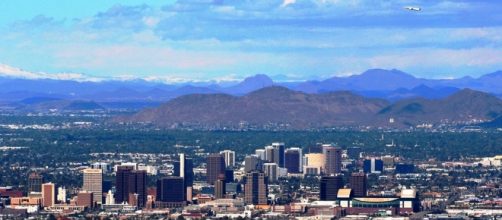There is a record-breaking heatwave in Arizona, and its effect will be felt in southwestern cities like Las Vegas and Phoenix with Flights getting grounded. Some airlines have already grounded a large number of flights at the Sky Harbor International Airport in Phoenix and have warned that many more might not take off since the temperature could rise to 120 degrees F. Weather forecasts predict similar high temperatures for several days.
The problem would be more severe for smaller planes since too much heat leads to changes in the air density that make takeoff difficult.
One solution is to impose weight restrictions in the form of carrying less cargo and fuel.
Actions taken by airports
The Daily Mail reports that airports in Arizona have taken measures to provide air-conditioned trailers on the airfield for the convenience of maintenance workers and other staff who handle the ground activities to prepare aircraft for flight. In view of the heatwave, airport employees are advised to take frequent breaks and to stay hydrated.
The forecast of 120 degrees in Phoenix is something that the city has not seen for two decades. The last time such a high was recorded was on June 26, 1990, when temperatures reached an all-time high of 122 degrees. All flights were canceled on that day because the runway at Sky Harbor was made from asphalt, and it became soft and started to melt.
Wunderground Weather Historian Christopher C. Burt has revealed that temperatures in Phoenix had crossed the 120 degrees mark thrice – twice in 1990 and once in 1995. However, the city has experienced 118 degrees as much as 11 times. The prediction is that it could go up to 124 degrees in Death Valley soon.
The medical implications
Heatwaves affect people's health and wellbeing. According to doctors, the body has internal cooling mechanisms, but these become ineffective when the temperatures go beyond 110 degrees. This can give rise to illnesses that range from heat rash to heat stroke.
The advice of doctors is to stay hydrated.
This is crucial because it will result in perspiration which, in turn, will help to stay cool. The logic is that when a person sweats, it makes the skin feel cool, and a portion of the heat is lost due to evaporation.
Arizona had 130 heat-related deaths in 2016 – the highest number in more than a decade. The observation is that the homeless accounted for one-third of heat-related deaths in 2016, and others that died were people whose air conditioners did not function.
The state Department of Health Services has indicated that every year approximately 2,000 people visit Arizona emergency rooms for treatment of heat-related illnesses. The heat is a serious public health hazard in Phoenix and Las Vegas where temperatures are usually more than 110 degrees during summer.


